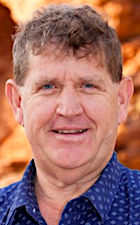Bush towns making their own Coronavirus plans is 'nonsense'
18 March 2020
Decisions about the Coronavirus risk in remote Northern Territory need to flow from government leadership and fast, says MLA Scott McConnell (pictured), who represents outback communities in his vast Stuart electorate.
Public input needs to be part of this but he describes as “nonsensical” the position of the Chief Minister that each community should be coming up with a plan “through their local decision making processes”.
“We know we need to flatten the curve. We know we need to keep the infection rate below the level of the capacity of our medical facilities to support the people who become critically ill,” says Mr McConnell.
“Waiting around like this is nonsensical. The other thing I don’t like, it’s a type of structural racism. They are not asking us in Alice Springs for our community response.”
He attacks “political taglines like local decision making”.
There is lack of leadership from the NT Government while there is good leadership from the land councils, who apparently have even delayed mining royalties payouts to discourage remote residents from travelling into town, and from the community controlled health sector.
“Those lines around local decision making are government rhetoric. It is the normal rubbish that they peddle out. The reason why they are not making plans for remote communities is because it is not their priority. That is – as it normally is – the northern suburbs of Darwin and to some degree Palmerston.
“They are the government for the northern suburbs, not the government for the Northern Territory.
Mr McConnell says: “It got worse since the Chief Minister has taken control of all communications.
“What are they going to do? Respond after an outbreak in a community? That doesn’t sound like a plan to me.”
NEWS: How well equipped do you think small remote communities are for dealing with their likely share of a global pandemic?
McCONNELL: They are just not well equipped. The information is not getting out there. There is some great work being done in indigenous languages and social media. But the idea that these communities can be driving the response themselves, because the government is giving us some spin line about local decision making, that’s just rubbish. It is true that there are no cases yet in the communities but that doesn’t mean we shouldn’t get ready for them.
NEWS: Does this include logistical issues such as taking people to larger centres for treatment, potential lock-down of communities, and providing the many facilities for individual isolation and quarantine for two weeks? Are these issues that may well be beyond the capabilities of bush communities?
McCONNELL: Of course they are. We’ve got to be beyond local politics here, and point scoring, about how things are delivered. This is a world wide emergency. Remote communities are between 150 and 1000 people. They tend to have one or two shops. People don’t tend to have refrigerators. They tend to shop two or three times a day. Their homes are likely to have 20 to 30 people living in them. The notion that people can go home and self-isolate and have a pantry filled with two weeks’ or a month’s worth of food – it simply does not happen, it’s not out in these remote communities. To support social distancing or isolation or maybe even a lockdown in the future, we need to have a plan for that. That plan cannot be developed in isolation of a remote community because the government is peddling out their political line, we’re waiting for local decision making.




Communities will not be able to deal with the virus and there is probably little that can be done to change this.
Aboriginal people will not adopt the self protection measures such as social distancing and will continue such practices as sharing a cigarette around a group. Five or so new infections in a few minutes.
With the exception of bolstering clinic staff there is little point working at the community level.
It is more useful to isolate communities and prevent the infection getting in for as long as possible.
That way when the virus eventually strikes communities there will be ICU beds in Alice Springs with respirators to save lives.
That strategy requires strong and decisive action.
It takes the political will to endure the backlash of shutting down the Bush Bus and keeping Yirara students strictly on campus.
The measures needed are inconvenient and unpopular.
Unfortunately, that probably means they won’t be taken.
It seems inevitable that we will not have a flattened curve but a huge spike where infections are doubling every day and the hospital is overwhelmed.
At this point it seems obvious that there will be lives lost that could have been saved with strong proactive measures.
@Jack- “Aboriginal people will not adopt the self protection measures….”. Who says so?
No one has shaken hands with me in Yuendumu in the last fortnight. Neither have we witnessed panic buying and opportunistic hoarding.
As for communities making decisions, we haven’t had a local council since 2008 and local leaders were disempowered long before then.